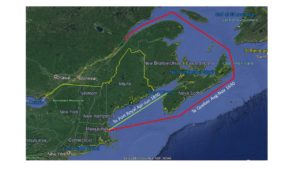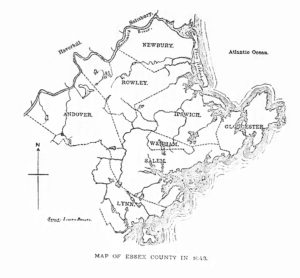
I think I mentioned in a previous post that I pulled away from my creative writing to work on genealogy research and a genealogy/family history book. I suppose it is really more of a biography.
The subjects are Elizabeth Cheney and Stephen Cross, who married in Ipswich Massachusetts in 1672. Elizabeth is the youngest daughter of John Cheney of Newbury Massachusetts, who is my wife’s immigrant ancestor in her paternal line. Over the years I’ve gathered a lot of information on John and finally decided I should write a book about him. What the book would look like crystalized in 2015. It would be about him and his ten children who lived to adulthood. I decided I would start gathering data with the youngest child, since published sources I looked at had less about Elizabeth than her siblings.
From 2015 to 2016 I began that process. I found that there was actually a lot of information about Stephen Cross, Elizabeth’s husband. It’s unfortunate that, in the era they lived, the women didn’t leave as many footprints as the men. But there were a lot of footprints to find and assimilate. In a couple of months of occasional work, I had the part about Stephen and Elizabeth up to 60 pages, and I wasn’t really done.
Woah! Sixty plus pages for one of John’s children. That meant a possible 600 pages about the children. Add that much or more for John, and I was looking at a monster, 700 page book. That wouldn’t work unless I did two volumes.

I had another thought back in 2016. The Stephen and Elizabeth material could be expanded into a stand-alone book. I put this on my list of writing to-dos, then, my research fervor having been stated for the moment, I went back to my creative writing work, knowing someday I would get back to Stephen and Elizabeth, and later to her siblings.
“Someday” was March 25, 2020. I dusted off what I did in 2015-16, realized I had much more research I could do, and got into it passionately. When I research a topic the work tends to consume me. From the research I made three discoveries that, so far as I can tell, have been overlooked—or maybe “not found” is better—by other researchers.
First, Stephen was a coastal mariner. He bought a boat and plied the coasts from Maine to Connecticut, hauling freight. That has always been known by researchers. So has his part in the colonial naval assault against Quebec in 1690 as part of King William’s War. But researchers have missed that he was also part of an assault against Port Royal, Nova Scotia, two months before the Quebec expedition. Smaller, closer, shorter than the Quebec expedition, the Port Royal expedition was a huge success. Stephen Cross was part of it, not as a mariner, but as captain of a company of foot soldiers.
This seems to have been missed by all researchers. My research has turned up Stephen in close to twenty published works, sometimes as a “bit player” in a genealogy but sometimes as a key figure in a Cross family book, story, or major website. I’m not even sure how I found out about his Port Royal adventure. I suppose it came from researching the disastrous Quebec raid, which I learned was shortly after the successful Port Royal raid. Searching a narrative of that must have turned up Stephen’s name. It didn’t take much digging to confirm his participation and role.
The fact that he led foot soldiers at Port Royal caused me to question the nature of his participation at Quebec. Every researcher I’ve found said he captained the ketch Lark in that raid. However, in original sources about the Quebec expedition, his name doesn’t show up as the captain of that vessel. Instead, it shows up because he attended a war council the evening that they anchored in the St. Lawrence just down river from the city. Of the thirty-odd people who attended that conference, only two were among those listed as captains of the thirty-some vessels in the expedition. That conference was for the officers of foot soldiers!
This also seems to have gone unnoticed by other researchers. Of the seven captains of foot companies at Port Royal, five attended that Quebec war council, including Stephen. My conclusion is he was he again a captain of foot soldiers, not a captain of a vessel.
So why have other researchers thought otherwise? In Perley’s History of Salem is a statement “In August, 1690, the Salem vessels joined the rest of the fleet which were at Nantasket to sail for Canada…. The ketch Lark of Salem, commanded by Capt. Stephen Cross, had been in the expedition to Canada, and had returned to Salem this year, and the arms on board were deposited in Mr. Derby’s warehouse.” Perley’s source for this is the Massachusetts Archives, volume 36, leaf 33.
Alas, to sort this out I would have to see the folio in the archive. It’s possible that Stephen simply piloted the ship from Boston back to Salem, since he was an accomplished coastal skipper. Or maybe he took over the vessel at some point during the expedition and his name didn’t get added to ship captains. It’s possible that the portfolio would tell.
At this point I believe I’m right about Stephen leading a company of foot soldiers at Quebec.
The other thing I discovered seemingly not found by other researchers is less adventurous. About the time of his marriage, Stephen bought a sloop, the Adventure, and hauled freight and passengers in it. He had a partner, Samuel Cogswell, who died three years later. All of this is well-known and is included in other accounts of Stephen. What is new is that, after Cogswell’s death, Stephen took on a new partner, John Lee (or Leigh) of Ipswich. The relationship is clearly spelled out in some court cases beginning in 1678 and extending into the 1680s. Accounts of Stephen’s life prepared by others mention the Adventure and Cogswell’s role in it, but not Lee’s.
I must end this. The post is much too long and probably of interest to me and no one else. I just wanted to let you know how good it felt to research a topic—in this case a person—and break new ground, find something no one else seems to have found.
It’s a wonderful feeling.